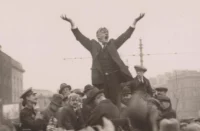“Social partnership” is anti-democratic, because a small group of insiders make the deal. This is then packaged and sold to workers as the best deal possible at this time, given the present circumstances.
Social partnership comes onto the horizon as a result of political, employment and economic crisis, in order to reduce workers’ expectations, demands and aspirations and to lay the ground for the introduction of austerity.
The trade union movement must reject this strategy.
To be clear, I am not condemning the entire trade union movement. There are many within the movement fighting against this strategy. Some comrades inferred that in last month’s Socialist Voice I was condemning the entire trade union movement in the North for not taking an anti-imperialist stance. This was not the intention, as many unions do.
Social partnership agreements are not binding on the government: it is free to treat them as advisory, while unions depend on the state to introduce legislation in the spirit of the agreement, which rarely happens.
The ultimate goal of social partnership is the demobilisation of union resistance in employers’ interests. Unions exchange wage moderation and industrial peace for an expectation of policy and institutional influence. The amount of influence is debatable. Some legislative regulations protecting workers were negotiated under social partnership but ultimately had to be passed by the government. Not all were: for example, legislation on migrant workers was promised but never implemented.
Trade unions always feared legislation on employment, but social partnership actually accelerated it. Of course the crowning glory of social partnership was the Industrial Relations Act (1990), which in effect stripped all power from unions and workers, transferring it to employers and the judiciary. The trade union movement was hoodwinked by Bertie Ahern, then minister for labour, who was seen as the workers’ friend, with guarantees, promises and assurances that it was in workers’ best interest to get this legislation through, as it would inevitably lead to better pay and conditions, when employment relations would improve immensely as a result of it. Yes, employment relations improved immensely—but for employers—as a result of the 1990 act.
The trade union movement had been softened up and became far too cosy around Government Buildings, believing their own bluster that they had influence on social policy. During this period the working class suffered devastating cuts to the social wage; the building of public housing was abandoned to the private sector; charges were introduced for the dysfunctional health service, on its knees as a result of continuous cuts. At the same time tax breaks were given to employers, speculators and investors as workers were robbed to pay Peter, Paul and every gombeen businessperson in the largest transfer of wealth to the ruling elite since the foundation of the state.
As a result of social partnership, union density collapsed. Strikes became a thing of the past, leading to a generation of union reps without any experience of collective bargaining or collective action.
As time went on, social partnership became more and more bureaucratic, with working groups, task forces, reviews, and committees, leading to avoidance, postponement, and lack of decision-making on contentious issues. Employers did not have to implement regulations, and many did not.
The private sector has almost complete autonomy to pursue corporate strategies, while employers are free to determine the form, structure and organisation of any internal collective bargaining unit.
The main achievement of social partnership was a victory for the employers in gaining pay restraint and industrial peace. The cherry on the pie was a plethora of anti-union legislation, not least the Industrial Relations Act. The government succeeded in lowering workers’ expectations, enabling them to impose austerity policies at will. In the public sector, “workplace partnership” has been used in a managerial manner to drive through a predetermined reform agenda.
The reliance of the trade union movement, particularly the larger unions, on social partnership as a strategy has over time engendered a reluctance to embrace and in some cases a fear of alternative strategies.
Social partnership created an unnatural division between the public and private sectors, and this was encouraged by the government, employers, and media. The Croke Park Agreement then divided the public sector unions. Social partnership has left the trade union movement a pale shadow of its former self: broken, demoralised, with falling union density and a serious lack of experience in collective action, leading to a fundamental lack of confidence.
The employers’ side, on the other hand, has grown in confidence as increasingly, and successfully, they turn to the courts to stop workers from striking. The anti-union legislation has led to many victories over unions, giving employers the confidence to now engage in aggressive union-busting tactics.
The legal environment is extraordinarily hostile to workers and to unions. Workplace partnership is non-existent, as the balance of power has shifted from workers to employers.
Social partnership has devastated the trade union movement; but still many within it are wedded to this paradigm. There has been a class war on workers’ rights for thirty years, and workers are losing hands down.
Social partnership is class betrayal. Unions must become radical or they will become redundant and ultimately defeated.






